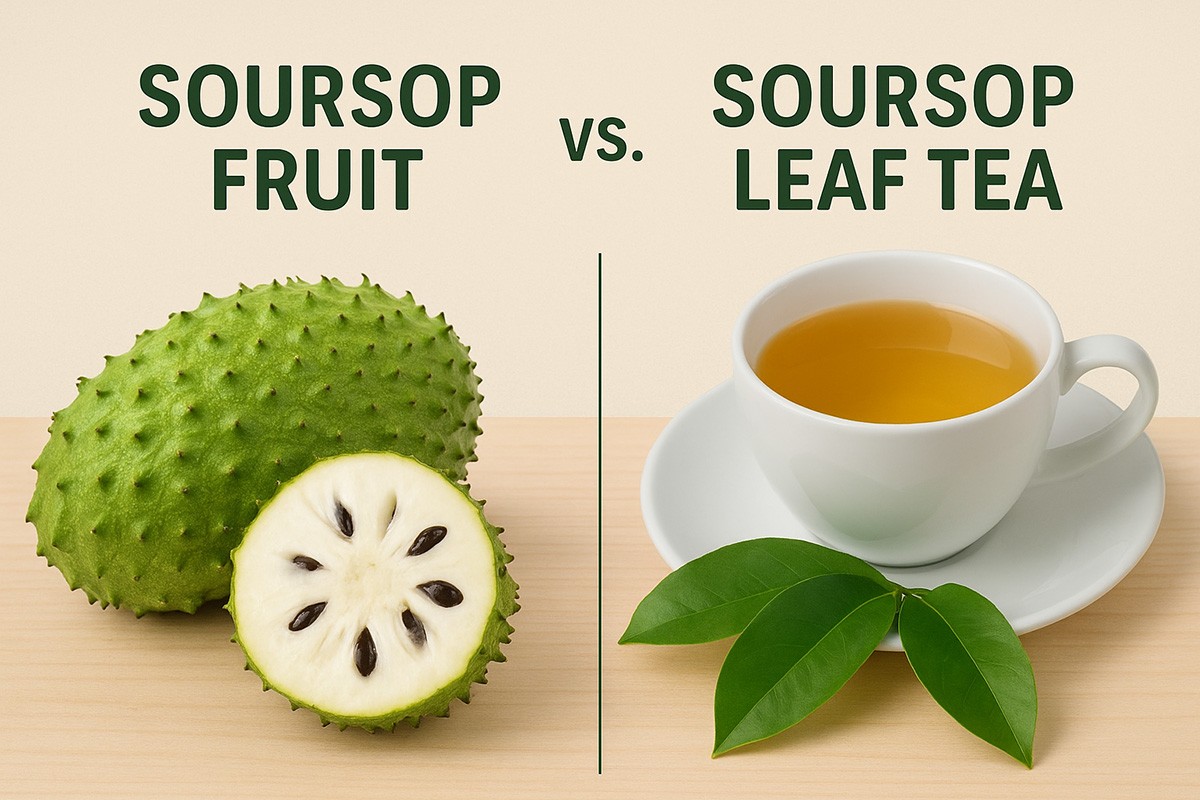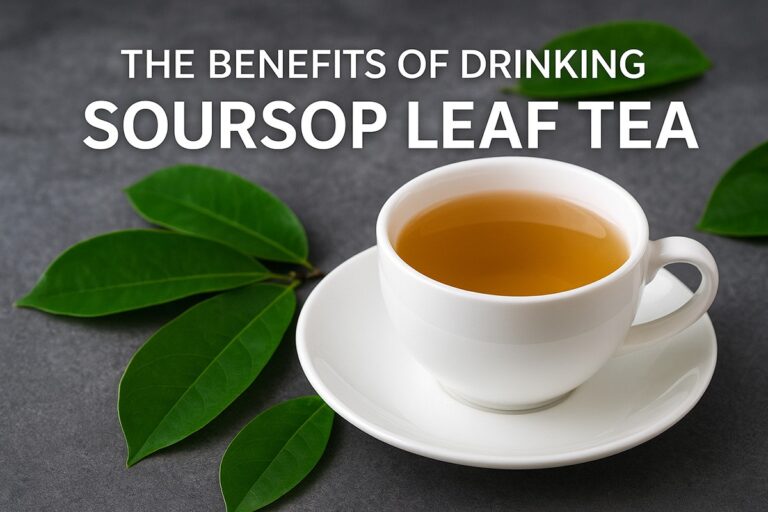Soursop (Annona muricata), also known as graviola, guanábana, or sirsak, is a tropical evergreen tree that has been part of traditional diets and medicine in the Caribbean, Latin America, Africa, and Southeast Asia for centuries. Both the fruit and the leaves are widely used—but in very different ways.
If you’ve ever wondered how soursop fruit compares with soursop leaf tea, here’s a complete breakdown.
1. Taste and Culinary Use
- Soursop Fruit
The fruit is large, green, and spiky on the outside, with a soft, white, custard-like pulp inside. Its flavor is often described as a cross between pineapple and strawberry with a hint of creaminess.- Common uses: eaten fresh, blended into smoothies, juices, ice creams, desserts, or jams.
- It’s prized for its refreshing, tropical taste.
- Soursop Leaf Tea
The leaves, when steeped in hot water, produce a mild, earthy, slightly bitter tea.- Common uses: drunk plain, or flavored with honey, lemon, or ginger.
- It’s not typically consumed for taste, but for its perceived wellness benefits.
2. Nutritional Value
- Fruit Nutrition
The fruit is rich in:- Vitamin C (immune support, antioxidant)
- B vitamins (energy metabolism)
- Potassium & magnesium (heart and muscle health)
- Fiber (digestive health)
Fresh fruit is also naturally hydrating and relatively low in calories, making it a healthy addition to the diet.
- Leaf Tea Nutrition
The tea does not provide the same macronutrients, vitamins, or minerals as the fruit. Instead, it’s valued for its plant phytochemicals, including acetogenins, flavonoids, and phenolic compounds. These are being studied for antioxidant, anti-inflammatory, and antimicrobial effects.
3. Traditional and Medicinal Uses
- Fruit
Traditionally eaten as food, but also used in folk remedies for digestive issues, fever, or hydration. Because of its vitamin content, the fruit supports general wellness. - Leaf Tea
In traditional medicine, soursop leaf tea is brewed to:- Support relaxation and better sleep
- Aid digestion and reduce inflammation
- Relieve fever or pain
- Support immune strength
These uses are based on cultural knowledge and preliminary research—not clinical proof.
4. Scientific Research
- Fruit
Most studies on the fruit focus on its nutritional value and antioxidant content. It’s generally considered safe as a food. - Leaf Tea
Research has focused on the bioactive compounds in the leaves. Laboratory studies suggest possible anticancer, antimicrobial, and anti-inflammatory properties—but these findings are preclinical. There are no large-scale human trials proving therapeutic effects from drinking the tea.
5. Safety Considerations
- Fruit Safety
Eating soursop fruit in moderation is generally safe for most people.- The seeds are not edible and contain potentially toxic compounds.
- Leaf Tea Safety
- Occasional tea drinking is usually considered safe for healthy adults.
- Long-term, heavy use may pose risks due to compounds like annonacin, which has been linked to neurotoxicity and atypical Parkinsonism in regions of high consumption.
- Possible drug interactions (especially with chemotherapy or CYP3A4-metabolized medications) mean patients should consult a healthcare provider first.
6. Availability
- Fruit: Found in tropical regions, and sold fresh or frozen in many international markets. Increasingly popular in juices, smoothies, and health food products.
- Leaf Tea: Available as fresh leaves, dried loose tea, tea bags, or powdered extracts sold in health stores and online.
7. Bottom Line: Key Differences
| Aspect | Soursop Fruit | Soursop Leaf Tea |
|---|---|---|
| Primary use | Food / Refreshment | Herbal remedy / Traditional medicine |
| Taste | Sweet, tropical, creamy | Mild, earthy, slightly bitter |
| Nutrients | Vitamins, minerals, fiber | Bioactive plant compounds |
| Research focus | Nutrition, antioxidants | Preclinical anticancer, antimicrobial, anti-inflammatory studies |
| Safety | Safe in moderation (avoid seeds) | Occasional use only; potential neurotoxicity if overconsumed |
Final Thoughts
The fruit and the leaves of soursop serve very different purposes. The fruit is a nutrient-rich food, delicious and refreshing, with plenty of vitamins and minerals. The leaves, prepared as herbal tea, are valued more for their traditional and experimental health benefits than for taste or nutrition.
If you’re exploring soursop for wellness, enjoy the fruit as part of a balanced diet, and approach soursop leaf tea with moderation and caution. Always consult your healthcare professional before using it as a health supplement, especially if you’re on medication or managing a medical condition.



